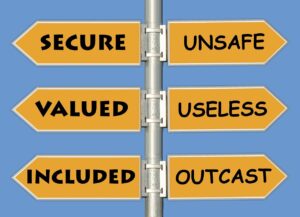Discover how data can help small businesses identify and address employee retention issues by providing deep insights into workplace dynamics.

Diversity, Equity and Inclusion is as Easy as ABCDE
Creating More Inclusive Workplaces Starts from Within
Small to mid-sized businesses (SMBs) can achieve their Diversity, Equity and Inclusion (DEI) goals armed with intentionally broadened hiring, promotion and retention practices. This is no easy task as it requires not only organizational data collection and analysis but personal reflection and humility.
Individuals in leadership may be accustomed to investigating, dismantling and rehabilitating flawed systems, but what if the flawed system is yourself?
Spectra Diversity’s “ABCDE” process can help companies of all sizes embrace DEI.
Five Simple Steps to Diversity & Inclusion at Work
In five simple actions, inclusive leaders can ready themselves for the changes they will ask of the company culture, by embodying that change within themselves. On the journey towards powering change within your organization, the starting place is right in the mirror.
One individual can hold simultaneously conflicting beliefs about the benefits and challenges of incorporating DEI into their organizations.
It is widely documented that DEI helps:
- promote feelings of respect and belonging
- mitigate burnout
- maintain high retention rates
- increase financial gains
That said, DEI may:
- feel uncomfortable
- challenge white male privilege
- force major change
- expose a tidal wave of -isms
- instigate conflict
- cost time and money to implement correctly
Faced with conflicting beliefs, a leader may seek out a consultant to do the work of change for them with a bit of companywide “bias training.” Implicit and unconscious bias training has its place, but that place is not at the start of the DEI process.
After conducting a DEI assessment, the ABCDE approach outlined in the Powering Inclusive Cultures Facilitation Kit continues the DEI work with unconscious bias, and seeks to raise personal awareness of such biases within the very leaders looking to spearhead change.
A is for Acknowledge Unconscious Bias
Standing in judgment of someone else’s biased missteps comes easily. But a real challenge is to turn the finger-pointing around in acknowledging biased tendencies within us.
The simple act of recognizing and owning our own shortcomings is a first step in redirecting flawed thinking and the behaviors that result. This awareness can help inform how we lead, and who we follow.
Ask tough questions like how you treat others who look and live differently than you as well as what assumptions you make about those you view as the same. Be vulnerable in the process of self-discovery.
Start with yourself and commit to helping others do the same.
B is for Be present and pause
The process of uncovering unconscious bias takes time. There is no room for automatic fight-or-flight responses. Instead, a pause offers an opportunity to make different and better or more inclusive choices.
When you slow down, you have the time to examine your belief systems to see the other person beyond the filter of your biases. A few minutes to reflect on reality vs. assumptions can have a positive lasting impact on all parties involved.
Consider the following self-reflection topics:
- What are my core beliefs?
- How do I react to differences in background, lifestyle and appearance?
- Do I acknowledge differences, do I leverage them for good?
- Do I say what I mean and mean what I say?
- Do I exhibit empathy during instances I cannot relate to?
Take one of the free Harvard Project Implicit Association tests and uncover your hidden biases. Taking a moment to uncover patterns in your thinking is vital to identifying personal bias.
C is for Consider the Others’ Point of View
After a period of self-examination, it is key to facilitate a dialogue that invites real stories from various points of view. Qualitative data is just as important as the quantitative data collection that will come later.
Listening without judgment is a skill that must be honed with practice.
Inclusive leaders exhibit authenticity, emotional resilience, self-assurance, inquisitiveness and flexibility. They are collaborative, transparent, culturally agile and value creating safe spaces for diverse team members to flourish professionally. Using regular employee assessments, like the Spectra Diversity and Inclusion AssessmentTM, can help you better understand what your employees need.
Exuding these traits makes room for diverse employees to speak their truth.
D is for Determine What to do Differently
Newly empowered by self-reflection and the points of view of those on your team, it is time to make a plan.
On the smaller scale that plan might include making adjustments to your communication style, or stopping biased thinking in its tracks before it leads to biased behaviors.
On the larger scale that plan should now include seeking out professional guidance to take qualitative and quantitative measurements within the organization to inform company-specific strategies.
Real numbers and real stories yield real results based on actual needs, unlike dead-end bound inferences and assumptions.
E is for Engage Others Through Dialogue
DEI is a journey, not a destination. Unconscious bias is, unconscious, and must be perpetually checked and redirected. Professional guidance is not a standalone one-and-done service.
Instead, a continuous relationship with DEI professionals like those at Spectra Diversity help you meet your company-specific DEI needs.
Regular measurement paints an accurate picture of what is going well and what is an ongoing challenge. Routine follow-ups help to keep DEI at the forefront and thus a less difficult topic to navigate.
Maintaining an open-door policy that invites regular engagement and authentic conversation helps to reassure your team of your commitment to the DEI journey.
That open dialogue may help you shed the rose-colored glasses of the leaders before you, instead allowing you to learn from the mistakes of the past and follow the up-and-coming DEI leaders of the future.
Commit to Data-Driven DEI
Making the commitment to improve your business through self-examination and best practice data collection is both socially imperative and financially responsible.
It is far from easy but the effort you make today will most decidedly power your heart, mind and bottom line tomorrow.
Sources:
Powering Inclusive Cultures: Why Measurement Matters, Christine Jones, 2023
Kornferry, The Journey to Becoming a More Inclusive Leader
Forbes, How to Tackle Unconscious Bias in Your Workplace, Meghan Biro, February, 2022
Harvard Business Review, Are You Aware of Your Bias?, Carmen Acton, February, 2022



